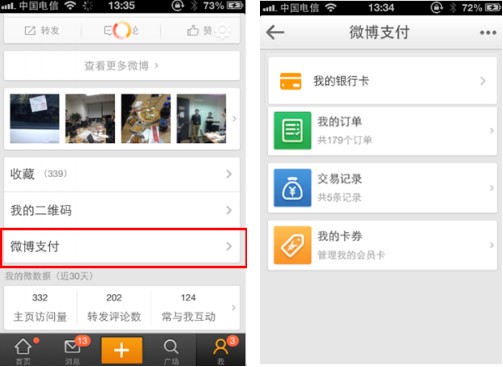Sina Weibo, the microblogging platform often called “China’s Twitter,” has partnered up with Alipay to launch a new payment platform called Weibo Payment. Users of Sina Weibo’s iOS app can now access Weibo Payment, which is an important part of the strategic partnership between Sina and Alibaba, two of China’s top Internet companies.
In addition to Weibo Payment, Sina Weibo has also added new features that not only facilitate offline payments, but also turn the microblogging service into a CRM platform that allows merchants to manage marketing campaigns and accept payments. Potential users include the 400,000 business accounts currently on Sina Weibo.
In a press conference today covered by TechNode (TechCrunch’s partner site in China), Fan Zhiming, the head of Alifinance (Alibaba’s SME financial services provider) in China, said that Weibo Payment was launched to compete directly with WeChat‘s payment services. Though Sina Weibo has played a highly influential role in public discourse within China (and other Chinese-speaking countries), it faces strong competition from WeChat, the messaging app created by competitor Tencent.
Sina Weibo has about 50 million daily active users, compared to WeChat’s 195 million active users per month. Sina Weibo’s growth has also slowed down since the end of 2012 and it has faced problems monetizing the service, which, as TechCrunch’s Kim-mai Cutler noted, recalls the criticism Twitter took several years ago for taking a long time to launch revenue-makers such as promoted tweets and in-stream ads.
Unlike Twitter, however, Sina Weibo will monetize through e-commerce, not advertising revenue, as Alibaba’s CTO told Kim-mai last year after the company took a stake worth $586 million in the microblogging service. Partnering with Alibaba, which dominates China’s rapidly growing e-commerce market, also adds a layer of convenience to Sina Weibo which might encourage existing users to stay and entice people to create new accounts.
In turn, the deal benefits Alibaba because the company has not been as successful with its social networking efforts as e-commerce, and it is important for them to ramp up those services as it heads toward its highly anticipated IPO.
So far, the partnership shows promise. The companies said today that 48% of active daily Sina Weibo users have already integrated their Alibaba accounts so they can share items from Alibaba’s e-commerce platforms, including online marketplaces Taobao and Tmall.
Weibo Payment is supposed to make online and offline payments, as well as social shopping, easier for Sina Weibo users. When a user shares an item from one of Alibaba’s e-commerce sites on their account, a “buy” button now automatically appears that connects to Alipay.
Alipay is currently aggressively targeting offline expansion. Offline payments can be made by scanning QR codes, which are ubiquitous in China despite their lack of popularity in Western markets, with the Sina Weibo and Alipay Wallet apps. Users who scan QR codes with Sina Weibo are automatically given the option of following the merchant’s account. Alipay said that 460,000 businesses supported QR code payments as of November 2013. The app can also use sound waves to connect with vending machines, which makes payments possible even when the devices are offline.
Alipay Wallet, which Alibaba says has been downloaded 100 million times since its launch in 2009, supports payments at vending machines operated by Ubox, ticketing machines in Beijing subway stations, 12306.cn, the online train ticket vendor operated China’s government, about 20,000 cabs in 10 Chinese cities, and some retail stores. Alipay Wallet also stores e-coupons and loyalty cards, like the Apple Passbook app.
Before partnering with Alipay, Sina Weibo offered its own payment service called Weibo Wallet, but that failed to gain traction. Sina Weibo head Wang Gaofei said today that Weibo Wallet will now be used instead for Sina’s financial products, which includes a credit service.
